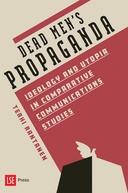Explore

Read online or download for free
Scroll down to open individual chapters
In Dead Men’s Propaganda: Ideology and Utopia in Comparative Communications Studies, Terhi Rantanen investigates the shaping of early comparative communications research between the 1920s and 1950s, notably the work of academics and men of practice in the United States. Often neglected, this intellectual thread is highly relevant to understanding the 21st-century’s challenges of war and rival streams of propaganda.
Borrowing her conceptual lenses from Karl Mannheim and Robert Merton, Rantanen draws on detailed archival research and case studies to analyse the extent and importance of work outside and inside the academy, illuminating the work of pioneers in the field. Some of these were well-known academics such as Harold Lasswell and the authors of the seminal book Four Theories of the Press. Others operated in the world of news agencies, such as Associated Press's Kent Cooper, or were marginalised as émigré scholars, notably Paul Kecskemeti and Nathan Leites. Her study shows how comparative communications, from its very beginning, can be understood as governed by the Mannheimian concepts of ideology and utopia and the power play between them. The close relationship between these two concepts resulted in a bias in knowledge production, contributed to dominant narratives of generational conflicts, and to the demarcation of Insiders and Outsiders.
By focusing on a generation at the forefront of comparative communications at this pivotal time in the 20th century, this book challenges orthodoxies in the intellectual histories of communication studies.
Early praise for Dead Men’s Propaganda
"Dead Men's Propaganda re-imagines and re-frames the early history of the communications field. This book is nothing short of fantastic and deserves a wide readership!"
— Henrik Örnebring, Professor of Media and Communication, Karlstad University
"Rantanen’s thorough and insightful account demonstrates why it is important to pay attention to the thinkers of the previous century who asked questions that are still relevant today."
— Professor Larry Gross, Professor Emeritus, Annenberg School for Communication and Journalism, University of Southern California
"Terhi Rantanen returns the study of international communication to its intellectual roots. The book highlights scholars who, as a transnational generational milieu, “shared memories of fighting the propaganda war together”, first against Nazism and then against Cold War communism. Rantanen's own analytical concepts are borrowed from this “forefront” generation between the two World Wars, especially from Karl Mannheim's ideas on generation, ideology and utopia, also from Robert K. Merton's outsider/insider perspective. An innovative book revealing a histoire croisée between European and US-American propaganda research and the ideologies and utopias in their background."
— Professor Stefanie Averbeck-Lietz, Institut für Politik- und Kommunikationswissenschaft, Universität Greifswald
"Dead Men’s Propaganda offers a fascinating account of the genealogy of comparative communications. Terhi Rantanen draws on decades of archival research to present nuanced and vivid portrayals of key figures in communication research and propaganda studies in the forty years following the First World War. Using concepts drawn from Karl Mannheim and Robert K. Merton, she shows how a generation of scholars and professionals from different fields and countries negotiated the ideological currents and utopian visions of their age. Anyone interested in the history of communication research has to read this book."
— John C. Nerone, Professor Emeritus of Communications Research, University of Illinois at Urbana-Champaign
"Anyone teaching or studying media and communications around the world will find this fine, well researched book to be utterly absorbing. It shows how ‘outsiders’ from central and eastern Europe and also from small town America helped to create a new field of study. They were enormously clever, moved across intellectual boundaries, and wrote with elegance and insight. They were also mostly Cold War warriors who had little time for female researchers. This book thus shows the origins of international communications research to be both awe-inspiring and embarrassing."
— James Curran, Professor of Communications, Goldsmiths, University of London
This book is included in DOAB.
Why read this book? Have your say.
You must be logged in to comment.
Rights Information
Are you the author or publisher of this work? If so, you can claim it as yours by registering as an Unglue.it rights holder.Downloads
- 6 - pdf (None) at Google Books.
- 24 - pdf (CC BY-NC) at Unglue.it.
- 32 - mobi (CC BY-NC) at Unglue.it.
- 44 - epub (CC BY-NC) at Unglue.it.
Keywords
- Comparative communications
- Media
- Propaganda
Links
DOI: 10.31389/lsepress.wmfweb: http://press.lse.ac.uk/site/books/m/10.31389/lsepress.wmf/
Editions




